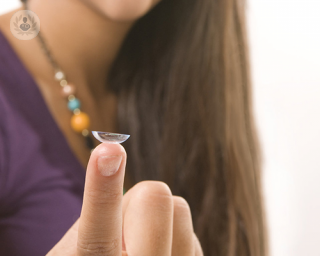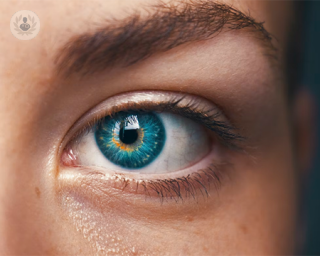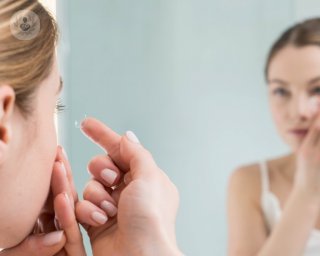Contact lens related problems
Mr Tristan McMullan - Ophthalmology
Created on: 05-30-2018
Updated on: 08-21-2023
Edited by: Sophie Kennedy
What are contact lens related problems?
Wearing contact lenses can cause a range of problems, from mild discomfort and blurred vision, to dry eye, an allergic reaction, scratches on the cornea, and corneal infection.
Some of these problems can be resolved by replacing the lenses with a new pair, or a pair in a slightly different size. To treat any infections or damage to the eye it is important to see an ophthalmologist.

Prognosis
Much of time when discomfort is experienced when wearing contact lenses, the problem is just mild irritation, but more rarely you could experience a sight-threatening infection that needs immediate medical attention.
Symptoms of contact lens related problems
Common symptoms experienced when wearing contact lenses could include:
- Red eyes
- Sore eyes
- Swollen, puffy eyes
- Dry eyes
- Blurred vision
- Feeling like you have something in your eye constantly
Medical tests to diagnose contact lens related problems
If you are experiencing problems with your contact lenses, your ophthalmologist or optometrist should be able to provide guidance at your regular check-ups. If you are suffering dry eyes, for example, this will be identified in an eye appointment.
What are the causes of contact lens related problems?
The most common causes of contact lens discomfort are:
Wearing your lenses for too long
Although there are different types of contact lenses with different instructions on the length of wear, it is important to follow these instructions. Some will advise wear for a few hours, whilst others claim to be safely worn overnight.
Wearing lenses that out of date
If lenses are past their sell-by date, irritation can occur and possible infections from bacteria.
Improper use of your contact lenses
Lenses can be delicate, requiring proper care. Whilst daily lenses will be disposed of after use, longer-wear lenses will need to be stored correctly in clean lens holders with fresh lens solution. It is also very important to wash your hands thoroughly before putting in your contact lenses. Equally, lenses should be put in before any eye make-up is applied. You should also never let anyone else your contact lenses.
Eye infections
If your lenses are not cleaned or stored properly, you risk getting bacteria into your eyes which could cause potentially serious infections.
Can contact lens related problems be prevented?
Yes, as long as you keep your lenses clean and properly stored, as well as using lenses that are not old, you should not experience problems with your contact lenses.
If you are having problems with a certain type of contact lens, there are other options you could try, under the recommendation of your ophthalmologist or optometrist. If you decide that contact lenses are not working for you, you could consider either wearing glasses or having vision correction surgery (e.g. LASIK or RLE).
Treatments for contact lens related problems
Whilst many problems will be solved by improving care and use, some people will only find comfort by trying a different type of contact lens, for example, or using special eye drops to prevent dry eyes whilst wearing contact lenses. If you develop an infection, seek medical attention immediately for treatment.
Which type of specialist treats contact lens related problems?
Optometrists would look after your daily use of contact lenses, advising on types and how to look after them. Ophthalmologists would also be able to advise on this, as well as treating problems such as dry eyes or infections.










